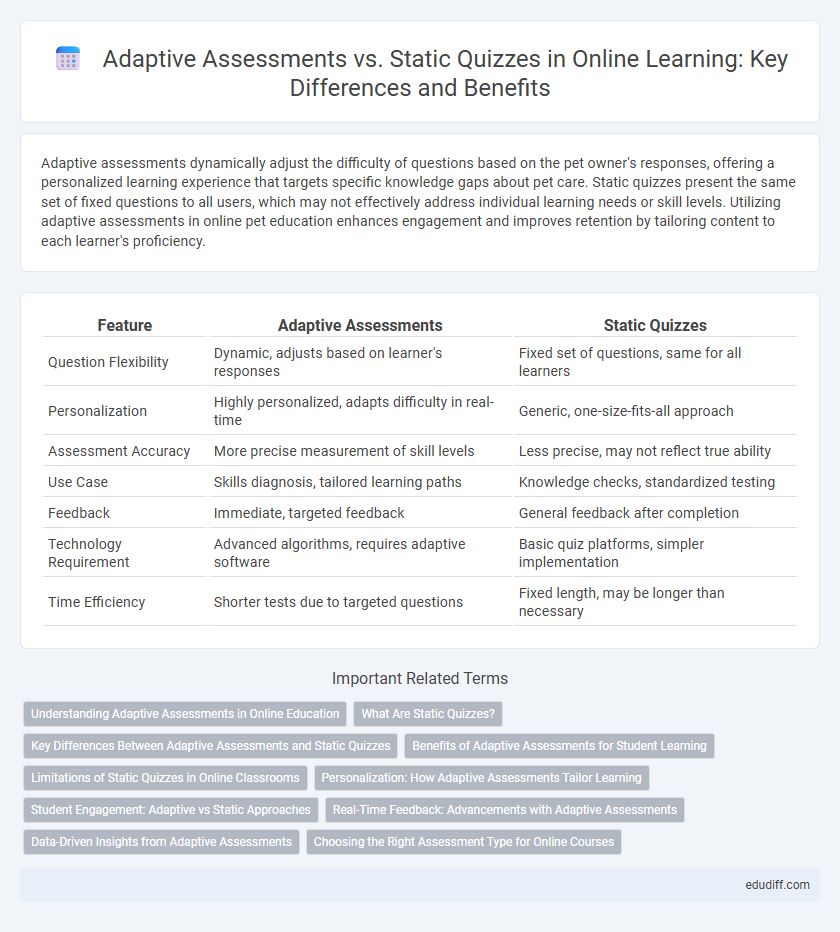Adaptive assessments dynamically adjust the difficulty of questions based on the pet owner's responses, offering a personalized learning experience that targets specific knowledge gaps about pet care. Static quizzes present the same set of fixed questions to all users, which may not effectively address individual learning needs or skill levels. Utilizing adaptive assessments in online pet education enhances engagement and improves retention by tailoring content to each learner's proficiency.
Table of Comparison
| Feature | Adaptive Assessments | Static Quizzes |
|---|---|---|
| Question Flexibility | Dynamic, adjusts based on learner's responses | Fixed set of questions, same for all learners |
| Personalization | Highly personalized, adapts difficulty in real-time | Generic, one-size-fits-all approach |
| Assessment Accuracy | More precise measurement of skill levels | Less precise, may not reflect true ability |
| Use Case | Skills diagnosis, tailored learning paths | Knowledge checks, standardized testing |
| Feedback | Immediate, targeted feedback | General feedback after completion |
| Technology Requirement | Advanced algorithms, requires adaptive software | Basic quiz platforms, simpler implementation |
| Time Efficiency | Shorter tests due to targeted questions | Fixed length, may be longer than necessary |
Understanding Adaptive Assessments in Online Education
Adaptive assessments in online education dynamically adjust question difficulty based on student responses, providing personalized evaluation and optimized learning pathways. Unlike static quizzes, which present fixed questions regardless of individual performance, adaptive assessments offer a tailored experience that enhances engagement and accurately gauges mastery. This approach improves knowledge retention and supports differentiated instruction by targeting students' specific strengths and weaknesses.
What Are Static Quizzes?
Static quizzes are pre-designed assessments with fixed questions and answer choices that do not change based on learner responses. These quizzes provide uniform evaluation criteria for all participants, enabling straightforward comparison of performance across individuals. Commonly used in online education, static quizzes assess knowledge consistency but lack the flexibility to tailor difficulty or content adaptively.
Key Differences Between Adaptive Assessments and Static Quizzes
Adaptive assessments adjust question difficulty based on a learner's responses, providing a personalized evaluation that accurately measures skill levels, whereas static quizzes present the same set of questions to all participants regardless of performance. Adaptive tests improve engagement and efficiency by targeting individual knowledge gaps, while static quizzes offer uniformity and simplicity in grading and analysis. Key differences include dynamic question selection in adaptive assessments versus fixed sequencing in static quizzes, impacting precision and adaptability in online learning environments.
Benefits of Adaptive Assessments for Student Learning
Adaptive assessments personalize the testing experience by adjusting question difficulty based on student responses, promoting targeted skill development and reducing test anxiety. This dynamic approach provides real-time insights into individual learning gaps, enabling educators to tailor instruction more effectively. Enhanced engagement and accurate measurement of student proficiency support improved learning outcomes and sustained academic growth.
Limitations of Static Quizzes in Online Classrooms
Static quizzes in online classrooms often fail to accommodate individual learning paces due to their fixed question sets and uniform difficulty levels. These assessments lack real-time adjustment, which limits personalized feedback and hinders accurate measurement of student understanding. Consequently, they can lead to decreased student engagement and ineffective evaluation of diverse learning needs.
Personalization: How Adaptive Assessments Tailor Learning
Adaptive assessments use real-time data to tailor question difficulty based on individual learner performance, enhancing personalization and engagement. Unlike static quizzes with fixed questions, adaptive tests dynamically adjust to each student's knowledge level, offering a customized learning experience. This targeted approach improves retention and identifies specific areas for improvement more effectively than one-size-fits-all assessments.
Student Engagement: Adaptive vs Static Approaches
Adaptive assessments dynamically adjust question difficulty based on student responses, enhancing engagement by providing personalized challenges that maintain motivation and reduce frustration. Static quizzes present a fixed set of questions, which may not cater to individual skill levels, potentially leading to disengagement due to questions that are too easy or too difficult. Research indicates that adaptive assessments improve student focus and persistence by aligning content with learner proficiency in real-time.
Real-Time Feedback: Advancements with Adaptive Assessments
Adaptive assessments provide real-time feedback by continuously analyzing learner responses and dynamically adjusting question difficulty to optimize understanding, a feature static quizzes lack. This immediate, personalized feedback enhances engagement and retention by targeting knowledge gaps as they occur. Modern adaptive assessment platforms utilize algorithms and data analytics to deliver precise, actionable insights that support effective learning paths in online environments.
Data-Driven Insights from Adaptive Assessments
Adaptive assessments continuously adjust question difficulty based on real-time student responses, generating nuanced data that reveals individual learning patterns and knowledge gaps. This dynamic approach provides educators with actionable insights through detailed analytics, enabling personalized instruction and targeted interventions. Unlike static quizzes, which offer limited data, adaptive assessments deliver a richer, more precise understanding of learner progress and proficiency.
Choosing the Right Assessment Type for Online Courses
Adaptive assessments dynamically adjust question difficulty based on learner responses, enhancing personalization and accurately measuring individual knowledge levels in online courses. Static quizzes present a fixed set of questions, making them simpler to administer but less responsive to diverse learner needs. Selecting the right assessment type depends on course objectives, learner variability, and the desired depth of skill evaluation.
Adaptive assessments vs Static quizzes Infographic

 edudiff.com
edudiff.com